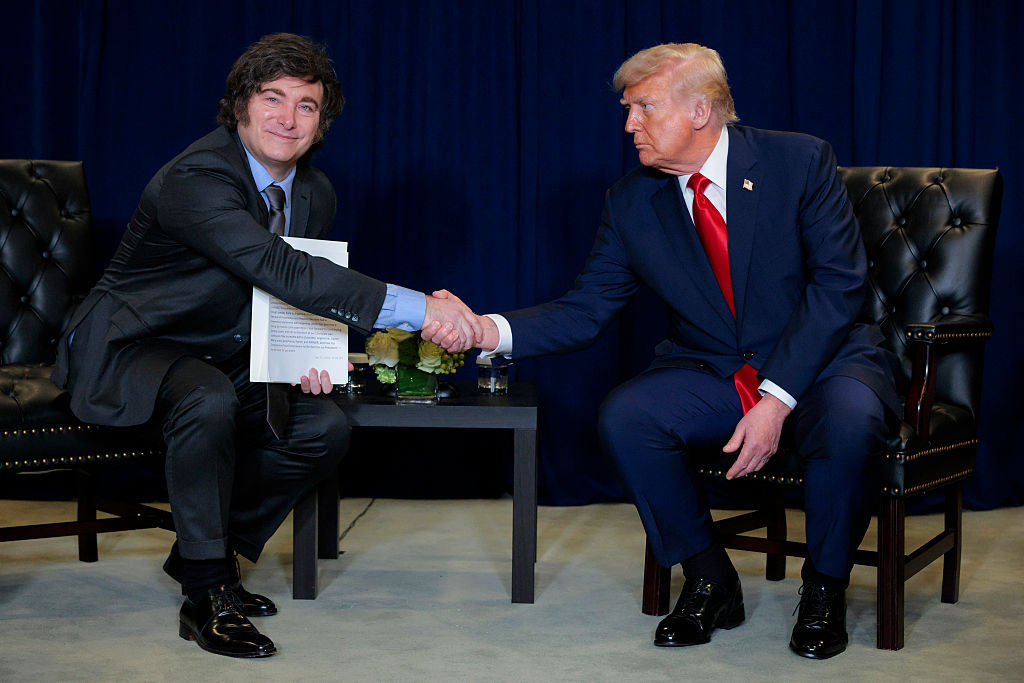
President Donald Trump offered a broad gesture of solidarity to Argentine President Javier Milei on Tuesday, announcing his intention to support the South American country amid new political and economic turmoil.
Trump and Milei met on the sidelines of the UN General Assembly in New York to address the recent volatility in Argentina’s financial market, sparked by the defeat of Milei’s party in Buenos Aires’ provincial elections.
“We’re going to help them. I don’t think they need a bailout,” Trump told reporters after the meeting, alongside Bessent and Milei. While Trump stopped short of committing to a financial bailout, his comments amounted to a critical lifeline.
On Wednesday, U.S. Treasury Secretary Scott Bessent announced the U.S. was “ready to purchase Argentina’s USD bonds and … also prepared to deliver significant stand-by credit via the Exchange Stabilization Fund.” He added that the two countries are negotiating a $20 billion swap line with Argentina’s central bank and to end the tax holiday for commodity producers converting foreign exchange. He also said that the U.S. “stands ready to purchase secondary or primary government debt.”
The announcements followed an unexpectedly large setback for Milei’s La Libertad Avanza party in the September 7 Buenos Aires elections, corruption allegations against Milei’s sister and closest advisor Karina Milei (which she denies), and a peso selloff ahead of national midterm elections on October 26.
AQ asked analysts to share their reactions and perspectives.

Nicolás Saldías
Latin America and Caribbean senior analyst at the Economist Intelligence Unit
The meeting between U.S. President Donald Trump and Argentina’s President Javier Milei, on the sidelines of the UN annual meetings in New York, took place against the backdrop of intense market volatility in Argentina following the stunning defeat of the governing La Libertad Avanza in the Buenos Aires provincial midterm elections on September 7.
The day before the meeting, U.S. Treasury Secretary Scott Bessent announced that the Treasury would “do what is needed” to support Argentina. The peso had depreciated rapidly in the days after the electoral defeat in Buenos Aires, prompting the central bank to spend more than $1.1 billion in three days to keep the currency within the IMF-stipulated non-intervention bands. Economy Minister Luis Caputo said that the government would “sell to the very last dollar” to keep the peso within its exchange rate band. This triggered a sharp rise in Argentina’s country risk premium as concerns mounted over its ability to honor its debts and defend the peso ahead of a heavy repayment schedule in 2026.
Markets rallied after Bessent’s comments and the government announcing a temporary tax holiday for grain exporters, in place until October 31, which is expected to generate more than $7 billion in foreign exchange. These measures helped to reverse the losses suffered by the peso and Argentine asset prices following the Buenos Aires election. Even so, the sense that Milei’s economic reforms are hanging by a thread is hard to ignore.
The government will need to regain the political momentum to secure a win in the upcoming October 26 midterm election. Its weakened political position partly reflects the fallout from damaging recordings that allegedly implicate members of Milei’s inner circle. Meanwhile, the economy has flatlined and is failing to deliver job creation. This adverse backdrop explains Milei’s declining popularity, which raises doubts about his party’s prospects in the midterms.
However, an extraordinary level of political and financial backing from the U.S. may help Milei turn the corner and raises the stakes of the election for voters and key players in Argentina’s politics. Trump’s endorsement of Milei’s re-election bid in 2027 demonstrates Milei’s risky decision to endorse Trump in 2024 during the U.S. presidential campaign and his close ideological alignment with Trump are bearing fruit. This message will likely echo loudly for other Latin American leaders who will be seeking to deepen ties with a U.S. turning a critical gaze to the region.

Milagros Gismondi
Chief economist at Invecq Consulting
The central bank’s aggressive intervention showed its determination to defend its exchange rate band, but also caused concern about Argentina’s falling dollar reserves. This concern spilled over into bonds last week, driving the country risk index to 1,500 basis points. The situation was unsustainable.
Then on Monday came Bessent’s first message, later reinforced by President Trump’s statements of support for President Milei and Economy Minister Caputo. It was a powerful signal that calmed markets almost instantly; the central bank did not need to sell reserves on Monday or Tuesday, the country risk index retreated toward 1,100 points, and Argentine bonds and equities staged a sharp rally.
Bessent’s Wednesday announcement outlined a menu of possible U.S. actions. Negotiations are underway for a USD20 billion currency swap, mirroring Argentina’s existing arrangement with China and possibly designed to serve as its replacement. Washington also signaled its readiness to purchase Argentine debt, either in the secondary market or directly, though this would probably occur only after the October 26 legislative elections.
In addition, the Treasury indicated it could extend significant stand-by credit through the Exchange Stabilization Fund—an instrument that would require congressional approval in Argentina. Beyond financing, U.S. officials have been in talks with American companies about potential direct investment across multiple sectors, contingent on a favorable electoral outcome.
Historically, the only major stabilization package of this kind in Latin America was the 1995 rescue of Mexico, when the ESF disbursed USD12 billion. Today, the ESF holds roughly USD19 billion in liquid foreign currency assets (mainly euros and yen), in addition to Treasury securities and SDR holdings, that could be mobilized in support of Argentina. These facts provide context, but key uncertainties remain. It is still unclear what form and what conditions the support will have, and whether it will arrive before the national legislative elections on October 26.
More importantly, the ultimate challenge is how Argentina’s economic program will be recalibrated after the vote—and whether the country can finally achieve the sustainability that has so far eluded it in 2025 without external assistance. For now, the announcement stands as a strong political signal. It is likely to anesthetize the market at least until the elections, alongside a new zero-export-tax policy for agriculture, which has also provided temporary relief by bringing in additional dollars.

Juan Cruz Díaz
Managing director at Cefeidas Group
The Trump–Milei encounter comes at a critical moment for Argentina. Milei faces legislative setbacks, declining approval, and persistent market volatility ahead of October’s midterms. The meeting offered both political and economic leverage: Trump’s public endorsement reinforces Milei’s domestic narrative and reassures markets.
Treasury Secretary Scott Bessent’s statements carry particular weight. By pledging “all options for stabilization” and describing support as “large and forceful,” the U.S. signals a shift from previous cautious approaches to regional financial crises. Markets responded quickly, with country risk indicators and the peso easing—showing how geopolitics, ideology, and presidential diplomacy can have immediate effects.
Politically, the endorsement strengthens Milei’s position. Trump’s portrayal of Milei as managing the “mess” inherited from former President Alberto Fernández reinforces his narrative of competence versus the Peronist establishment. This may energize core supporters and influence undecided voters, but critics argue the support could come at the cost of domestic sovereignty, add to the debt burden, and require concessions—risks the opposition could use to challenge Milei.
The World Bank’s acceleration of up to US$4 billion in financing, part of a broader USD12 billion package, signals confidence in Argentina’s reform agenda. The package focuses on mining, tourism, energy, and supply chains and complements U.S. backing, though its conditionality is less visible and unlikely to affect the immediate political dynamic.
Milei’s main challenge is turning diplomatic and financial momentum into real economic gains and legislative results. Building bridges with governors and other political groups will be crucial for this. Short-term market relief helps, but lasting success depends on whether reforms improve everyday life for Argentines and are seen as meaningful by the broader population—key to strengthening his position ahead of the October elections.





